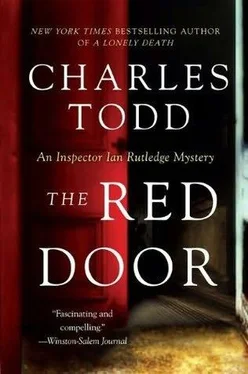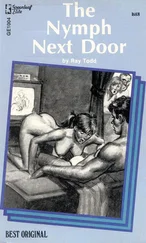Charles Todd - The red door
Здесь есть возможность читать онлайн «Charles Todd - The red door» весь текст электронной книги совершенно бесплатно (целиком полную версию без сокращений). В некоторых случаях можно слушать аудио, скачать через торрент в формате fb2 и присутствует краткое содержание. Жанр: Полицейский детектив, на английском языке. Описание произведения, (предисловие) а так же отзывы посетителей доступны на портале библиотеки ЛибКат.
- Название:The red door
- Автор:
- Жанр:
- Год:неизвестен
- ISBN:нет данных
- Рейтинг книги:3 / 5. Голосов: 1
-
Избранное:Добавить в избранное
- Отзывы:
-
Ваша оценка:
- 60
- 1
- 2
- 3
- 4
- 5
The red door: краткое содержание, описание и аннотация
Предлагаем к чтению аннотацию, описание, краткое содержание или предисловие (зависит от того, что написал сам автор книги «The red door»). Если вы не нашли необходимую информацию о книге — напишите в комментариях, мы постараемся отыскать её.
The red door — читать онлайн бесплатно полную книгу (весь текст) целиком
Ниже представлен текст книги, разбитый по страницам. Система сохранения места последней прочитанной страницы, позволяет с удобством читать онлайн бесплатно книгу «The red door», без необходимости каждый раз заново искать на чём Вы остановились. Поставьте закладку, и сможете в любой момент перейти на страницу, на которой закончили чтение.
Интервал:
Закладка:
The boy shyly held out his hand and said, "How do you do, Uncle Ian?"
As Rutledge took the small hand in his, the boy added, "I rode the train. All the way from Scotland. And I was very good, wasn't I?" He turned to look up at his grandfather. "And I shall have the pick of the litter of pups in the barn, if I mind my manners while I'm in London."
His slight Scottish accent came as a surprise, though it shouldn't have done. Rutledge searched for words of welcome and found none.
"And so you shall," Trevor said, filling the awkward silence. As they turned to go, Trevor added, "Well, then. Are we to stay with you at the flat or with Frances at the house?"
The relief that this first encounter had gone off well enough was nearly intolerable. Yet after all his apprehension, the week's visit had turned out to be an unexpectedly happy one. Nothing was said about the more recent past-nothing was said about anyone who had stayed at home, though Morag had sent him the Dundee cake she had made for him at Christmas in the hope that he might have come north after all. "It's past its prime, she says," Trevor warned him, "but the fault is no one's but yours."
Rutledge had taken it with apologies and promised to send Trevor's housekeeper something in return.
He knew, none better, that Trevor refrained from saying that she would have preferred to see him, that she was getting no younger and still doted on him. The thought was there in Trevor's eyes.
When Rutledge arrived at the Yard after settling his godfather with Frances, a patient Sergeant Biggin was waiting for him in his office. He rose as Rutledge walked through the door and wished him a good morning.
"There's news?" he asked the sergeant. "Good-or bad?"
"It appears to be bad news," Biggin reported. "We'd like to have you come with us, sir, and have a look at what we've found. It appears Mr. Teller's clothing has come to light-on the back of a costermonger near Covent Garden. An alert constable spotted the man and is keeping him in sight."
Rutledge said only, "I'll drive," and he led the way to his motorcar. As they turned toward Covent Garden, Rutledge asked, "Do the clothes appear to be damaged in any way? Torn? Bloodstains washed out?"
"No, sir, according to the constable they only appeared to be a little soiled from pushing a barrow through wet streets. But that was at a distance."
They found a place to leave the motorcar and walked the rest of the way. Covent Garden was quiet, the frenetic life of the dawn fruit and produce market in the Piazza had finished for the day, only the sweepers busy cleaning up the last of the debris and gossiping among themselves, their voices loud in the silence after the morning bustle. The opera house looked like a great ship stranded on a foreign shore.
Sergeant Biggin found his constable on a street corner, his back to the doorway of a tobacco shop. He nodded to Biggin and then acknowledged Rutledge just behind the sergeant.
"Morning, sir. That tea shop down the street. The costermonger is in there. That's his barrow-the one with the red handles-just outside."
"Has he seen you?" Rutledge asked. The barrow wasn't evidence. The man's clothing was.
"I think not, sir. Wait-the shop door is opening-"
They watched as a heavyset man sauntered through the door, but instead of the light-colored suit of clothes that Jenny Teller had told the police her husband had worn to the clinic, and presumably out of it as well, he was wearing a pair of coveralls and Wellingtons, a flat cap on his head.
"Damn!" the constable said grimly. "Beg pardon, sir, but that's him. The costermonger. But where's his clothing?"
"He's just sold it to someone else. Come on!" Rutledge strode swiftly down the street toward the tea shop. The costermonger looked up, and then his gaze sharpened as he recognized that one of the men bearing down on him was a uniformed constable, the other a sergeant, moving fast in the wake of a man in street clothes.
They could see the changing expressions on his face-alarm, the debate over whether to flee or stay where he was. Outnumbered, he chose to stay, bracing himself as Biggin said, "Good morning."
Their quarry said nothing.
"I've been told that you were seen wearing different clothing earlier in the day," Biggin went on. "We'd like to have a look at it."
They could see the man weighing any profit he might have made against trouble with the police. He chose a middle course.
"What's wrong with an honest man making a living out of old clothes that have come into his possession?" he demanded grudgingly.
"Nothing," Biggin retorted. "Except they aren't old, and it's the gentleman who was once wearing those items that we're interested in hearing about."
"I know nothing about him. I found the suit of clothes in a neat pile by the river, just below Tower Bridge. I hung about, to see if anyone was to come along and claim them, and when no one did, I thought I ought not to look a gift horse in the mouth, as the saying goes."
It was interesting, Rutledge observed, that the costermonger knew precisely which clothing the police were after. They would have been a windfall, worth as much as he might earn in a week's time selling old clothes and boots and men's hats. There had been no pretense of ignorance, no denials. It was possible he was telling the truth.
"And where would the items in question be now?" Biggin asked. The costermonger reluctantly answered, "I sold them to a gent in the tea shop. He fancied the cut of them, he said."
The constable was already reaching for the door latch and disappeared inside the shop. He came out shortly thereafter with a known pickpocket, one Sammy Underwood, a well-spoken man of forty-five, who could pass for a gentleman in Teller's suit of clothes. Rutledge had seen him at flat races, hobnobbing with rich punters and readily accepted in his pressed castoffs. A better sort of purse to pick there than the casual encounter at a street crossing.
Underwood demanded his own apparel back before he would consent to give up Teller's clothing. The exchange made, he scuttled off before the police took an interest in his activities.
They spoke to the costermonger for another quarter of an hour, but he refused to change his story, although he claimed that he had not found shoes or hat with the trousers, shirt, and coat.
Sergeant Biggin turned to Rutledge. "A man doesn't leap into the river wearing his hat and shoes."
"For all we know, they were taken away before the costermonger found the rest of Teller's belongings."
Rutledge made a brief examination of the clothing. The labels had been removed.
The costermonger said quickly, "They were that way when I found them."
"Yes," Biggin retorted, "and the moon's the sun's daughter."
"It's true," the man exclaimed. "I'll swear to it, if you like."
Rutledge tended to believe him, although the sergeant remained dubious. But if it wasn't the costermonger-then who had taken the time to remove them? Someone intent on throwing dust in the eyes of the police? But if it hadn't been for the vigilance of a constable, the clothing would have disappeared into the backstreets of East London, never to come to light.
"Ye canna' find a man sae easily in different clothes," Hamish pointed out.
To buy a little time, perhaps. Or travel.
In the end, the costermonger lost his sale, and Rutledge, after complimenting the constable for his good eye, left with a box under his arm containing what appeared to be Walter Teller's clothing.
He went directly to Bond Street, and walked up and down, looking in shop windows. And then he saw what he was after. Grantwell amp; Sons specialized in dressing men who spent much of their time in the country, and displayed over a handsome chair in the window was a man's suit of similar style and cut.
Читать дальшеИнтервал:
Закладка:
Похожие книги на «The red door»
Представляем Вашему вниманию похожие книги на «The red door» списком для выбора. Мы отобрали схожую по названию и смыслу литературу в надежде предоставить читателям больше вариантов отыскать новые, интересные, ещё непрочитанные произведения.
Обсуждение, отзывы о книге «The red door» и просто собственные мнения читателей. Оставьте ваши комментарии, напишите, что Вы думаете о произведении, его смысле или главных героях. Укажите что конкретно понравилось, а что нет, и почему Вы так считаете.












